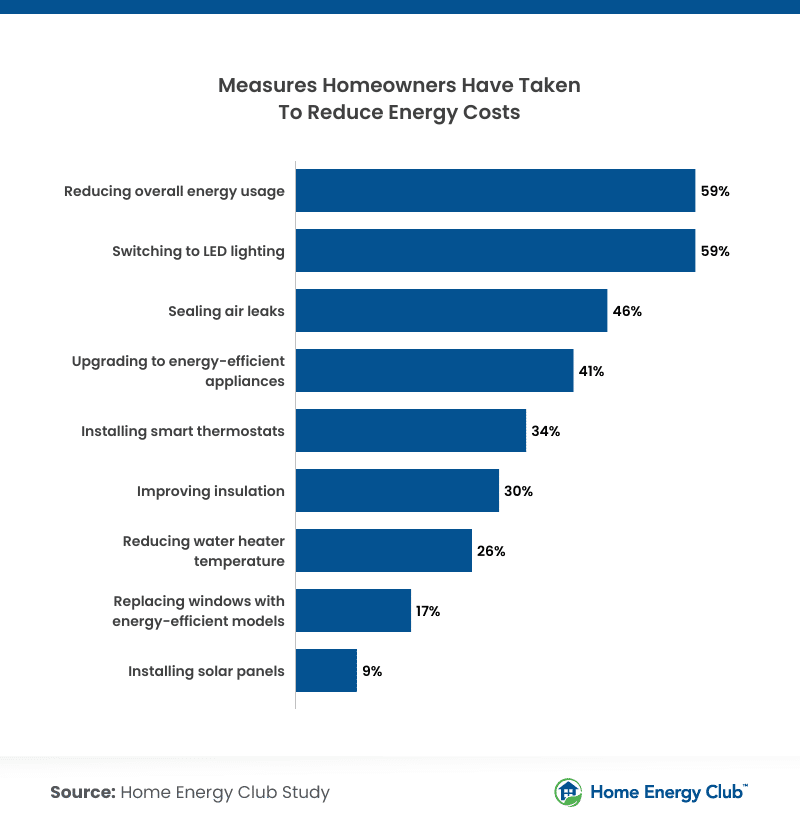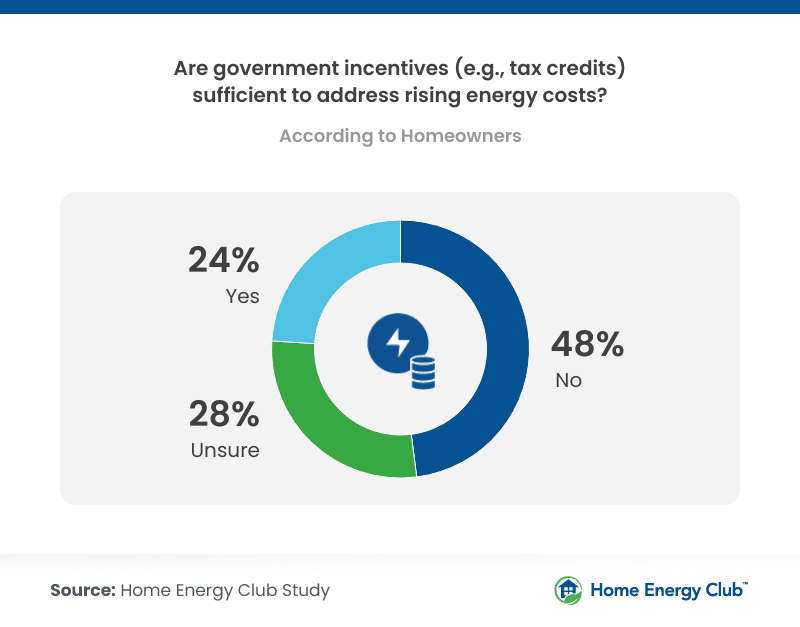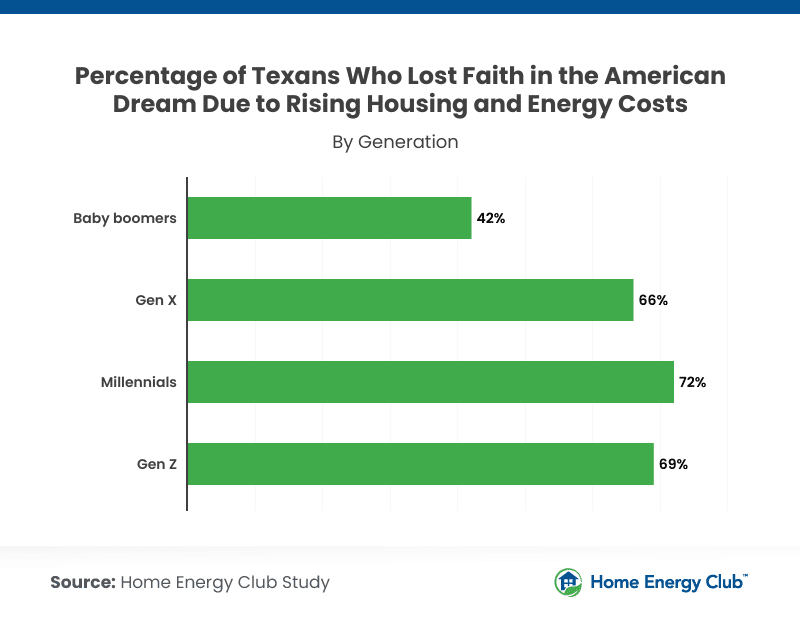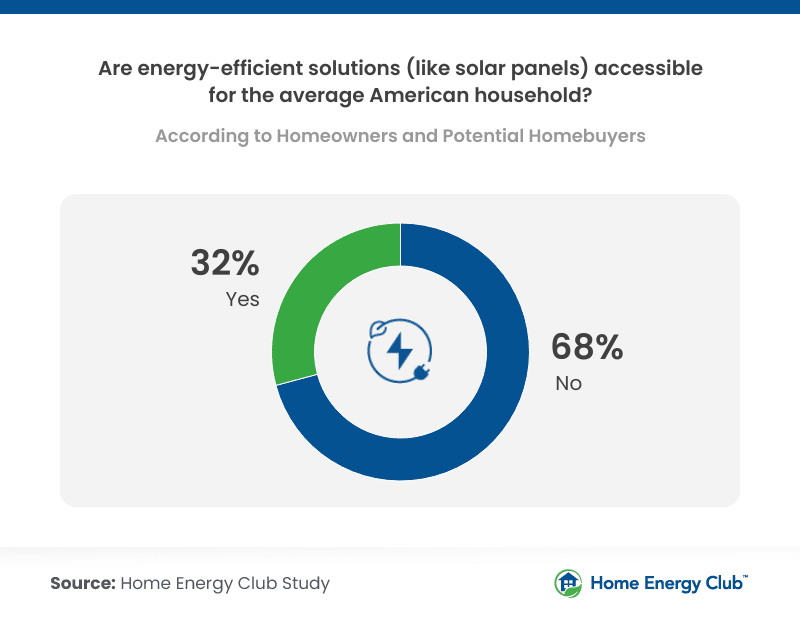
Key Takeaways
- Nearly half (47%) of homeowners say rising energy costs are a significant barrier to homeownership, with Gen Z homeowners (70%) being the most impacted.
- On average, homeowners allocate 10% of their monthly budgets to energy costs, and 1 in 10 allocate 20% or more.
- Rising energy costs have affected 1 in 10 homeowners’ ability to make mortgage payments.
- Rising energy costs have prompted 15% of homeowners to consider selling their homes, especially Gen Z (26%).
- Amidst rising energy costs, 66% of potential homebuyers would most likely consider homes with energy-efficient upgrades.
- Over half of Gen Z respondents (54%) feel the homeownership aspect of the American Dream is less attainable due to rising energy costs, with 20% believing it is entirely unattainable.
Energy Costs and Homeownership
High energy costs (including electricity rates) have strained many Americans’ budgets lately, forcing them to make difficult financial decisions.

Just under half of homeowners (47%) identified rising energy costs as a major barrier to buying a home. This was especially common among Gen Z homeowners (70%) — compared to 51% of millennials and 40% of Gen Xers. On average, respondents allocated 10% of their monthly budgets to energy costs, with 1 in 10 homeowners spending 20% or more.
Different generations have adopted various energy-saving strategies in response to escalating electricity costs. Gen Z homeowners prioritized improving insulation (44%), while 56% of millennials and 67% of Gen Xers focused on reducing overall energy usage. Baby boomers most commonly switched to LED lighting (72%) to cut energy costs.
Read more: Energy buying guide

The financial impact of rising energy costs has affected homeowners’ ability to maintain and improve their properties. More than one-third (35%) said that essential home maintenance or upgrades had been delayed or prevented due to rising energy expenses. However, nearly 1 in 2 homeowners said they would be extremely or very likely to invest in home maintenance or upgrades if energy costs were stabilized.
In some cases, the financial strain has reached critical levels: 1 in 10 homeowners reported that energy costs have affected their ability to make mortgage payments. For 15% of respondents, rising energy costs have led them to consider selling their homes. Gen Z homeowners were the most likely to contemplate selling (26%), followed by baby boomers (17%), millennials (16%), and Gen Xers (11%).
If you’re struggling to pay your energy bills, there are payment assistance programs you can consider. You may qualify for help through the Low Income Home Energy Assistance Program (LIHEAP) or the Weatherization Assistance Program (WAP).
Shifting Preferences in Housing
Increasing energy expenses are reshaping buyer preferences and decisions, causing some to consider delaying their buying process and renting over buying. Over half of potential homebuyers (53%) said they would delay purchasing a home and opt to rent instead if energy costs continue to rise, while 44% would consider delaying homeownership indefinitely.

Most of the potential homebuyers we surveyed (66%) were more likely to consider homes with energy-efficient upgrades due to increasing energy costs. For many, affordability evaluations now heavily factor in energy expenses, with nearly three-quarters of respondents (74%) incorporating energy costs into their financial planning. Baby boomers were the most likely to factor in energy costs at 90%, compared to 71% of Gen Z homebuyers.
Older generations also demonstrated a higher likelihood of delaying home purchases indefinitely if energy costs continued to rise. Among baby boomers, 67% said they would consider holding off on buying a home, while only 37% of Gen Zers expressed the same hesitation. Yet, many prospective buyers indicated that stability in energy costs could reignite their plans — 48% said they would be extremely or very likely to proceed with purchasing a home if energy prices were more stable.
Rising energy costs have also made the prospect of downsizing more appealing to older potential homebuyers. Gen Xers (73%) and baby boomers (70%) were the most likely to consider moving to smaller homes, while younger buyers — millennials (58%) and Gen Z (51%) — were less likely to entertain this option.
American Dream Under Pressure
Rising energy costs are changing how younger generations perceive homeownership and the American Dream.

More than half of Gen Z respondents (54%) said that homeownership, a key element of the American Dream, feels less attainable because of rising energy costs. Among them, 20% went further, stating that homeownership now seems entirely unattainable.
Texans are feeling the pressure of increasing expenses, and for many, those costs are forcing a reevaluation of long-held aspirations. About 2 in 3 (66%) said they have lost faith in the American dream because of rising housing and energy costs. This sentiment was strongest among millennials (72%).

More than three-quarters of Texans (78%) believed that rising electricity costs are making homeownership in the state less financially viable. This concern spanned age groups and reflects broader anxieties about affordability and the future of housing in Texas.
Energy-efficient solutions could help ease energy costs, making homeownership more affordable. However, these products often require upfront investments that may be out of reach for some Americans.

Nearly half of Gen Z respondents (46%) were optimistic about the accessibility of energy-efficient solutions such as solar panels — making them the most hopeful generation in this regard. Older generations expressed more skepticism, though: Baby boomers (74%) and Gen Xers (71%) were the most likely to believe that energy-efficient solutions are not within reach for the average household.
Read more: Energy costs for homeowners vs. renters
Homeownership Amid Increasing Costs
Rising energy costs are causing many Americans to delay home purchases, prioritize energy-efficient upgrades, and question the American Dream. While younger generations remain hopeful about energy-saving solutions, older ones are more cautious. These concerns emphasize the need for affordable, sustainable energy options to make homeownership more attainable.
Methodology
We surveyed 1,003 Americans to explore how rising energy costs are reshaping their ability to achieve or maintain homeownership. Among them, 51% were homeowners, and 49% were potential homebuyers. The generational breakdown of respondents was as follows: Gen Z (12%), millennials (51%), Gen X (29%), and baby boomers (8%). We collected survey data on January 9, 2025.
About Home Energy Club
Home Energy Club makes it easy for Texas homeowners to find the best electricity rates and save money with exclusive discounts from trusted providers. We focus on energy efficiency and transparency, helping homeowners avoid hidden fees and make smarter choices — something especially important as energy costs continue to rise. By offering reliable tools and advice, we’re helping homeowners take control of their energy expenses.
Fair Use Statement
Noncommercial sharing of these findings is allowed if you include a link to this article.

